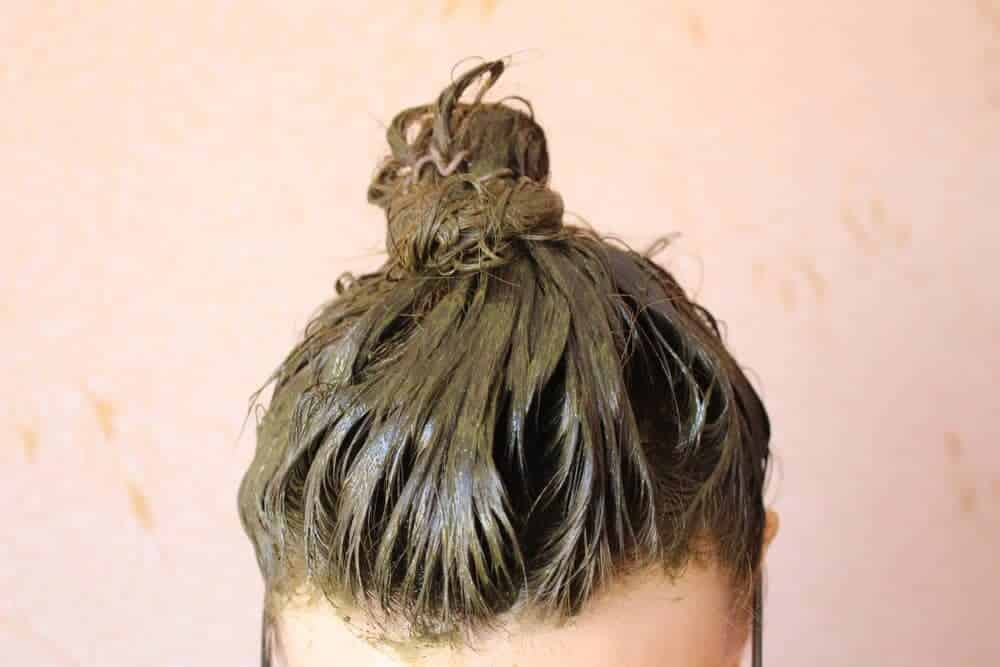Henna, a natural and ancient beauty product, has been used for centuries not only to create stunning body art but also as a hair dye. In fact, henna leaf powder has been used to pigment and condition hair since at least 9000 years ago in modern-day Pakistan. Its popularity spread throughout Africa, Asia, and the Middle East, with even Cleopatra wearing henna decorations. Today, henna remains a popular alternative to harsh chemical dyes for those looking for a more natural approach.
This guide will delve into what henna is, how to use it effectively, and provide a list of our top picks for the best henna hair dyes on the market.
Henna’s unique properties make it an attractive option for those seeking a chemical-free way to achieve their desired hair color. Not only does it condition and moisturize hair, but it also adds shine and vibrancy. When used as a dye, henna can create a range of colors from subtle browns to vibrant reds.
In this guide, we’ll explore the benefits of using henna hair dye, including its ability to cover grays and add body and texture to dry hair. We’ll also provide tips on how to apply henna, what to look for when choosing a product, and answer common questions about customizing and washing your hair after application.
We’ve compiled a list of the top 10 best henna hair dyes on the market, taking into account factors such as color range, quality, and price.
From budget-friendly options to premium products, we’ll help you find the perfect henna dye for your hair type and desired color.
What You Need to Know About Henna Hair Dye
To kick off our series of product reviews, let’s take a step back and examine the fundamental concept behind these products: henna. This ancient plant-based dye has been used for centuries to adorn the skin with intricate designs, and its popularity continues to grow today. As we delve into the world of henna products, it’s essential to understand what sets them apart from one another.
In this section, we’ll explore the key factors to consider when selecting a henna product that suits your needs.
What Is Henna?
Unlike traditional hair dyeing processes that rely on chemical reactions, henna works by forming bonds with the natural keratin in your hair, resulting in a unique staining effect. This means the color will evolve over time and eventually fade, unlike chemical dyes which can be grown out or bleached out. One of the key characteristics of henna is its ability to react with the natural tone variations within your hair, rather than applying a uniform color.
As such, it won’t erase existing highlights or lowlights. Instead, it will warm and deepen the overall shade of your hair, imbuing it with a subtle ‘henna glow’. While it can’t lighten or darken your locks, henna excels at adding rich, reddish tones that condition and shine from within.
Why Should You Use a Henna Dye vs. a Standard Dye?
While many modern hair dyes rely on strong chemical additives to achieve the desired color, studies have raised concerns about the potential long-term health implications of these synthetic ingredients. In fact, individuals who are frequently exposed to hair dye may be at a higher risk of developing certain types of cancer. For those who prioritize their health and well-being, or are simply looking for an alternative to potentially hazardous chemicals, henna dyes offer a safer option.
Pure henna is widely regarded as the safest hair dye choice available, posing no known risks to users. Furthermore, synthetic hair dyes can cause significant damage to your locks, necessitating special moisturizing treatments to prevent dryness and brittleness. In contrast, henna has natural conditioning properties that not only improve shine and strength but also help to thicken fine or thinning hair, making it a popular choice for those seeking a more holistic approach to hair care.
Important Factors to Consider in a Henna Hair Dye
When selecting a henna hair dye that suits your unique locks, remember to factor in these key elements. Consider the level of coverage you desire: do you want to conceal grays or add rich tones? Think about your natural hair color and whether you prefer subtle enhancements or bold transformations. Additionally, ponder the type of ingredients you’re comfortable with – are you looking for chemical-free options or specific additives like coconut oil or keratin?
The Color of the Henna Hair Dye
While natural henna leaves typically impart a reddish tone to hair, many brands offer variations on this theme by blending their henna with other herbs. To achieve brown and black shades, for instance, henna can be combined with Indigofera, or true indigo, which yields a blue-black pigment. Several products on our list incorporate plant-based ingredients in this way to create distinct hues.
Beyond these natural combinations, manufacturers may also add dyes, salts, or chemicals to their henna formulas. However, it’s essential to exercise caution when dealing with such additives, as they can sometimes irritate the scalp. If you’re seeking a genuine alternative to commercial hair dyes, choosing a henna formula with synthetic components is actually counterproductive. Some users further customize their henna by introducing additional ingredients that can influence the final shade.
More information on popular henna additives and how to modify your color is available later in this article.
Powder vs Cream Henna Hair Dye
Unlike many hair dyes, henna typically arrives in a powdered form. This is because the powder requires a curing process in warm water to achieve optimal color results. Keeping it in its powdered state until just before use ensures that it will be at its peak performance when applied. In contrast, cream dyes, although convenient, require a compromise on purity for the sake of speed.
By preparing your own hair color, you take control of the process and become an active participant rather than simply a consumer. If you’re committed to avoiding potentially harmful ingredients and allergens, sticking to purer options is definitely worthwhile. Additionally, mixing your own henna can be a fun and rewarding experience that allows for customization and creativity.
Top 10 Best Henna Hair Dyes 2024
Best Overall Henna Dye: The Henna Guys Red Henna Hair Color
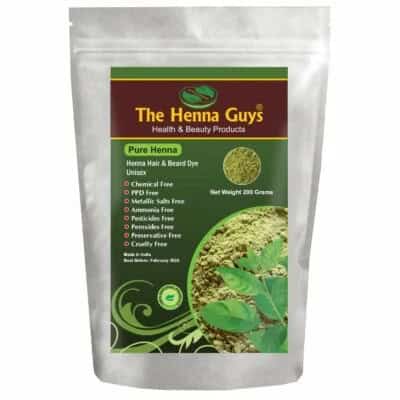
The Henna Guys stands out by offering high-quality, pure henna powder as well as a range of herbal blends that provide natural shades from dark brown to deep red. This triple-sifted powder is easy to apply and produces vibrant results, making it perfect for both beginners and experienced users. The company’s commitment to using only clean herbal pigments and no harsh chemicals or fragrances ensures a safe and reliable experience.
Their products are not just limited to henna-based dyes; they also offer a variety of herbal hair treatments, shampoos, and conditioners that cater to different hair types and needs. The fact that their products are raw, ethically sourced, vegan, gluten-free, and cruelty-free further solidifies their reputation for providing high-quality, natural alternatives.
The included gloves, cap, and instructions also demonstrate the company’s attention to detail and willingness to help customers achieve the best results. This product is suitable for almost anyone looking for a reliable, non-irritating henna experience or seeking to explore different herbal pigments. While it may not be suitable for creating long-lasting henna tattoos, multiple applications can still produce progressive deepening of the color and desired shade.
The only drawbacks are that it may not stain deeply enough on some hair types and may require several applications for optimal results.
Best Premium Henna Dye: Zenia Pure Natural Henna Hair Dye
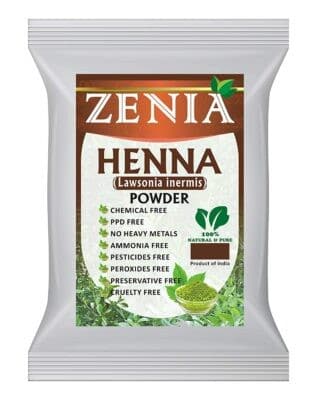
This highly pigmented henna powder offers a vibrant color that can be easily customized using Zenia’s range of natural herb powders. The body art quality ensures a smooth paste that washes out easily from hair, leaving no residue behind. With a rich, dark red to burgundy hue, this henna is particularly well-suited for creating bold, long-lasting colors. For those who enjoy experimenting with different shades and blends, Zenia’s product line offers a wealth of options for customization.
The company prides itself on sourcing high-quality herbs from around the world and providing transparent information about their products’ origin and potency. While it may not offer vegan, gluten-free, or cruelty-free certification, this henna powder is a great choice for those seeking a strong pigment and a unique color experience.
Best Orange-Toned Henna: Hannah Natural 100% Pure Henna Powder
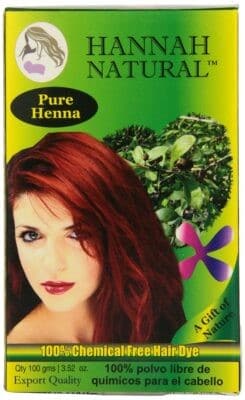
Hannah Natural’s 100% henna leaf powder is a straightforward option for those seeking a natural hair dye. The product has a moderate, earthy aroma that isn’t overpowering and rinses out easily after use. While the initial tone of the henna can be quite bright and orangey, it tends to settle into a softer red hue over time with proper washing.
As a pure henna product, it possesses strengthening and conditioning properties for hair, allowing users to customize their experience by adding their preferred ingredients if desired. The company’s focus on simplicity is reflected in its minimal online presence, sourcing its henna leaf from India and offering additional all-natural hair dye options utilizing indigo for pigment.
Hannah Natural’s primary goal is to promote a more natural world, with updates about product availability and information on the detrimental effects of chemical products shared through their Facebook page. This product is suitable for those seeking a basic yet effective henna experience at a moderate price point. However, it may yield an orange tone that can result in a glowing effect for darker hair or a carrot-top effect for very light locks.
Best Budget Henna Dye: Godrej Nupur Henna Natural Mehndi
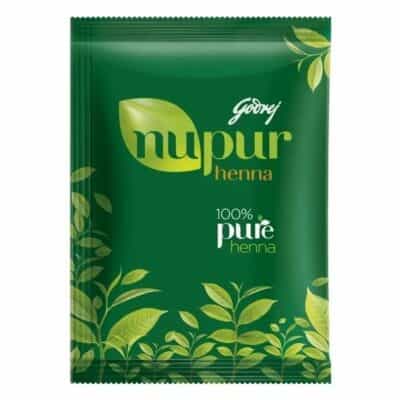
Godrej Nupur’s herbal blend, featuring 9 conditioning herbs, offers a unique combination of benefits at an affordable price. This powder-based formula promises to repair, thicken, and promote hair growth while also darkening it. Unlike some other henna products, this blend doesn’t boast strong pigmentation. Instead, it provides a subtle tint that can range from strawberry blonde to burgundy depending on your original hair color.
While it’s not suitable for body art, it does offer a conditioning treatment-like effect. Godrej Nupur is an Indian company with a rich history dating back to 1897. They export their products directly and are well-known for their body care range, including soaps and air fresheners. Their henna is sourced from Rajasthan, India, where the region’s distinctive burgundy tones are prized for their quality.
This product may appeal to those whose hair has suffered from harsh chemical treatments or heat styling. With its nourishing and conditioning properties, it can help repair damaged locks. While its ability to promote faster hair growth is uncertain, it does offer a mild tint that can be built upon over time. If you’re looking to experiment with coloring in stages, this blend could be an excellent starting point. You could follow it up with pure henna to deepen the color later.
This product’s pros include its all-natural herbal composition, conditioning and healing properties, and mild hair tint. However, some may find drawbacks in its lack of strong pigmentation and the fact that it’s not made from pure henna leaf.
Best Fair Trade Henna Dye: Light Mountain Natural Hair Color & Conditioner
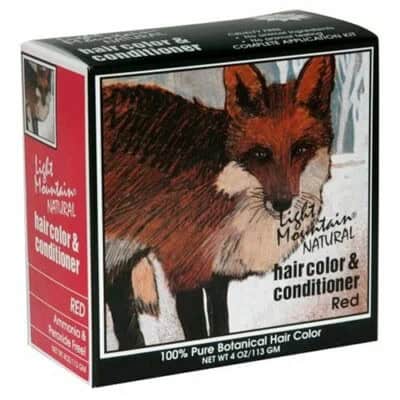
Light Mountain’s henna powder offers a unique combination of organic and fair trade certification, making it an attractive option for those seeking chemical-free hair dye. The 4-ounce size provides ample supply for multiple applications, and the company’s commitment to purity and testing ensures that their products are free from impurities and chemicals.
While not body art quality in terms of pigment or texture, the henna powder still offers gentle, non-irritating coverage that can help thicken and healthify hair. Light Mountain’s gray coverage formulas are particularly noteworthy, making it a reliable choice for those seeking all-natural options.
The company’s dedication to organic ingredients and close relationships with growers is admirable, and their use of only four ingredients – henna, indigo, cassia, and amla – in their shades and gray coverage line adds to the product’s appeal. While some may find the chunkier texture harder to wash out, overall Light Mountain’s pure henna option is an excellent choice for those prioritizing safety and natural ingredients.
Simplest Henna Dye: Just Jaivik Henna Powder
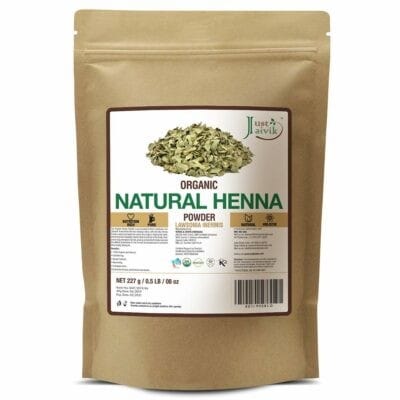
This organic henna powder from Just Jaivik is a timeless classic that has earned its place in many a beauty routine. With a natural red hue, it’s perfect for those looking to add a pop of color to their locks without resorting to artificial dyes. The powder itself is finely sifted and blends smoothly into a paste that’s easy to apply – just be sure to follow the instructions on the package, which surprisingly recommend applying it to dry hair rather than wet.
As you’d expect from an organic product, this henna powder is free from harsh chemicals and artificial additives, making it a great choice for those with sensitive scalps or skin. The company behind Just Jaivik has been around since 2013, and has built a reputation for sourcing its herbs and supplements from ethical producers worldwide. While they may not have a cruelty-free certification to their name, they do guarantee that all of their products are vegan-friendly.
For those with darker locks looking to cover up any stray grays or add some warmth to their natural color, this henna powder is a great option. Just be aware that it may not produce the same level of depth and richness on lighter hair, which can result in a more carrot-top like hue.
Overall, this product is a great choice for anyone looking to add some organic glamour to their locks, with its easy blendability, conditioning properties, and natural red tint making it a great addition to any beauty routine.
Best Bulk Quantity Henna Dye: H&C 100% Natural and Pure Henna Powder
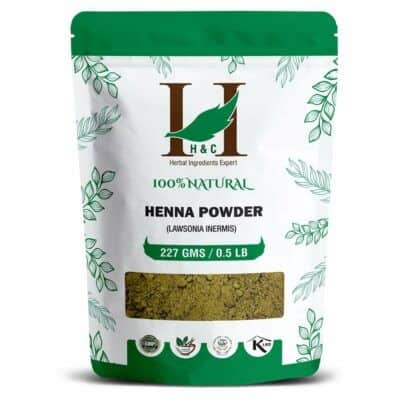
Light Mountain’s henna powder offers a unique blend of chemical-free and triple sifted goodness at an affordable price. Editor’s Rating: This powdered gem is perfect for those seeking a darker, more purple-toned henna experience. With its ability to condition hair like traditional henna, it’s no wonder this product has gained a loyal following. This powder may not be ideal for skin use, as warned by the manufacturer, but its potential for stunning body art designs is undeniable.
The blended texture of the henna paste can have a slightly slimier consistency than other powders, making it perfect for those who enjoy working with a thicker mixture. For those seeking to achieve traditional copper tones, this product may not be the best option. However, its darker pigment can produce brown or purple-toned shades on hair, offering a beautiful alternative. When paired with common add-ins like acids, cassia, and amla, this powder allows for endless customization options.
H&C, the company behind this henna powder, is an online herbal company based in Ahmedabad, India. They specialize in providing organic botanical products worldwide via their online platforms. With a focus on promoting healthy living, H&C offers bulk quantities of their herbs at reasonable prices. Their social media presence is also active, sharing product information and promotions across Instagram, Twitter, and Facebook.
For those looking for a henna powder that doesn’t lean too heavily into orange tones, this option is definitely worth considering. While it may not produce the traditional copper shade, its conditioning properties remain unchanged. It’s an excellent choice for those seeking to add some purple or brown hues to their locks.
Best Copper-Shaded Henna Dye: Mi Nature Henna Powder
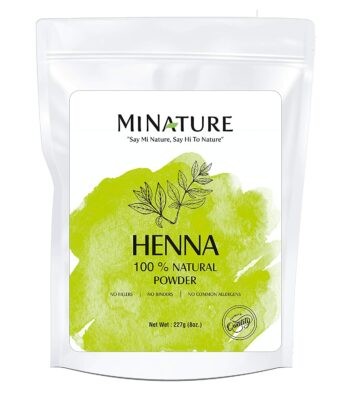
The appeal of this FDA-certified henna dye lies in its ease of application and bold copper payoff. The powder is finely ground, evenly coating the hair to produce a strong copper effect on light shades. To further customize the color, users can blend it with indigo according to the provided guide, which also offers recipes for deep conditioning and healing treatments.
While some may find the tone slightly more orange-toned, reminiscent of saffron, this variation is attributed to factors such as the henna’s origin or growing conditions. The product emits a strong earthy scent and leaves hair feeling softer and smoother. The company behind this henna, Mi Nature, maintains a relatively low online presence, primarily selling through third-party platforms.
However, their website provides helpful information about their production methods and offers guidance on different hair treatments. Notably, their henna is raw, vegan, and FDA-certified, with botanicals processed in an FDA-registered facility in India. This coppery henna is well-suited for those seeking a straightforward application process and customization options. The provided color guide helps users anticipate the final result, even when mixing with indigo.
Additionally, the henna enhances hair shine and strength as expected from high-quality products. The product’s pros include its traditional copper shade, customizable color options, and potential use in conditioning treatments. Cons include a slightly saffron-toned rather than burgundy hue, as well as an unusual scent that may be off-putting to some users.
Most Shade Options: Henna Dye: Rainbow Henna Persian Brown
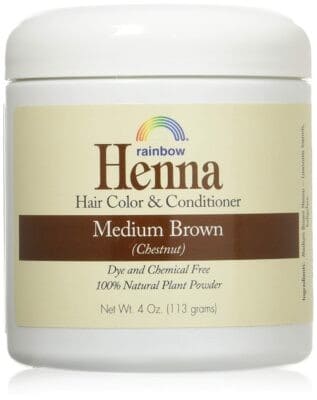
Rainbow Henna offers a vast array of botanical hair colors, impressing with its comprehensive range. With a blend of natural henna and pigments like indigo, cassia, marigold, and other herbs, this brand stands out from the crowd. By avoiding chemical additives, Rainbow caters to those seeking natural alternatives to traditional hair dyes. The absence of bleaching elements means that golden shades won’t lighten your hair. The scent is strong and mossy, which may affect blending and washing.
Since each shade requires a unique formula, experiences can vary between colors. Some hues might provide better nourishment or gray coverage than others. With over 40 years of experience in producing natural body products, Rainbow has honed its craft through small-batch production for quality control. The company’s range extends beyond henna to shampoos, conditioners, and soaps.
Their gentle baby products and organic line, Stony Brook Botanicals, demonstrate their commitment to health-conscious offerings. For those looking to transition away from chemical hair dyes but don’t want to go red, Rainbow provides a multitude of alternatives. Those seeking natural color options can choose from the preset colors without needing to blend or mix formulas. However, patience is required when applying this thicker paste, as uneven coverage may occur on thicker hair.
On balance, pros include the great variety of colors, all-natural ingredients, and cruelty-free and vegan credentials. The cons are the chunky texture, varying benefits between shades, and potential difficulties with blending.
Best Chemical Dye Alternative: Surya Brasil Henna Dark Brown Cream
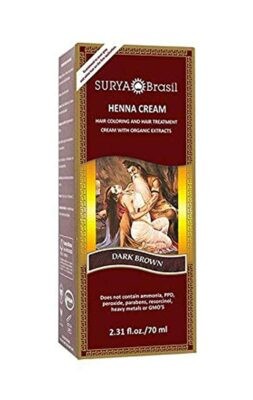
We appreciate Surya Brasil’s cream henna dye for its unique blend of convenience and natural ingredients. Unlike traditional chemical hair dyes, this product skips many harmful chemicals like ammonia, PPD, synthetic fragrances, and metals. The formula contains soothing compounds like aloe vera and arnica flower extracts, making it a great alternative to other hennas on the market.
One of the standout features of this cream is its applicator bottle, which allows for easy application close to the hairline. It’s also suitable for covering grays well, making it a great option for those looking to maintain their natural color. The amount of cream in each bottle is sufficient for two applications, and it has a much milder scent compared to other henna products.
While this product may not be entirely free from potential irritants or allergens, it’s still a great option for those who want a healthier alternative to chemical hair dyes. As part of Surya Brasil’s mission to prioritize human and environmental health, the company uses natural ingredients and botanicals from around the world to create various beauty products.
This cream henna dye is perfect for those who want a more traditional hair dyeing experience without the hassle of mixing and curing traditional henna products. It may not be the most natural option available, but it’s certainly a step in the right direction. For those looking for a simple change that can benefit their health and the planet, this cream is a great starting point.
Your Full Guide to Henna Hair Dye
Need further clarification on the world of henna hair dye? Our comprehensive overview is here to provide a thorough understanding of this popular natural alternative, covering all aspects you should consider when exploring this option for coloring your locks.
How to Apply Henna
I recently used Light Mountain Natural Henna for my hair dyeing needs and was thoroughly impressed – I highly recommend it! As with any henna product, each packet comes with its own set of instructions, but most follow a similar process. To start, you’ll need to prepare the henna by mixing it with warm water and blending it into a paste-like consistency.
The henna then needs to ‘cure’ for a period of time – this can range from a few hours to overnight – which helps release the pigment, resulting in a more vibrant hair color. Before applying the henna, make sure you’re properly prepared. Wear gloves to protect your skin from staining, and consider applying petroleum jelly around your hairline and ears as added precaution. You may also want to apply the henna in the shower or over an old towel to minimize mess.
Once the henna is ready, evenly apply it to clean, damp hair, working from root to end. Cover your hair with a cap or plastic wrap, allowing the henna to set for several hours – applying heat can help speed up this process. Unlike chemical dyes, henna requires patience, as it takes time to penetrate and color the hair. Finally, after the desired color has been achieved, rinse out the henna paste.
Be prepared for a lengthy process, as it may take some time to remove all of the paste from your hair.
Can You Wash Your Hair After You Apply Henna Hair Dye?
When it comes to preserving the vibrant new color job, patience is key. Post-treatment, refrain from shampooing your locks for at least 3-4 days, as some color residue may still be present. As you continue to wash and condition, expect subtle nuances in tone over the next week or so, as your hair gradually settles into its final hue.
Can You Customize Your Henna Hair Dye?
The debate surrounding henna customizations within the community can be quite polarizing. While some enthusiasts enthusiastically endorse various add-ins, others argue that these modifications merely hinder the natural process of henna’s staining properties. Ultimately, it comes down to personal preference whether one chooses to explore unique combinations or stick with a traditional approach.
What Can You Add to Henna Hair Dye?
In the world of henna dyeing, various add-ins are used to achieve unique effects. However, it’s essential to note that these formulas may react differently on different hair types. Here are some common additives and their effects: Chamomile tea can be added to enhance golden tones and subtly lighten the color when using a henna-cassia blend. Pure henna, however, is less likely to show significant changes. The calming scent of chamomile also has conditioning properties for the scalp.
For those seeking purple tones, beet juice may seem like an attractive option. Its strong pigment can dye cloth and skin naturally. Some users claim it helps create a striking plum color in henna-dyed hair. However, be warned: beet juice is messy and can stain surfaces, skin, and clothing. Its effectiveness is also debated. Another common additive is the combination of cider vinegar and lemon juice. This acid-based formula can intensify the color and make it bolder.
However, users with dry or damaged hair should exercise caution, as this addition may exacerbate these issues and counteract henna’s conditioning properties. To enhance red tones in henna-dyed hair, some users add hibiscus tea to their mixture. Stronger teas can even introduce purple undertones. Essential oils, on the other hand, can be used to mask the unpleasant scent of curing henna or enhance its color.
Some popular choices include tea tree, eucalyptus, and lavender, which also offer benefits for hair and scalp health. Turmeric, a textile dye with a strong yellow pigment, is another popular additive. When combined with henna, it can create golden colors and coax out ginger and strawberry blonde tones.
What Shouldn’t Be Added to Henna Hair Dye?
When it comes to henna ingredients, there are some that simply don’t add up to the expected results. Take coffee and wine, for instance. Some folks believe that adding these substances will deepen or change the color of their henna dye job. But the truth is, they’re largely ineffective due to poor bonding properties with hair. Instead, they’ll leave your henna smelling less than pleasant and may even cause some caffeine jitters (remember, this stuff can be absorbed through the skin!).
Another common misstep is mixing plant fats like coconut oil into your henna mixture. While these oils are fabulous for hair care in general, they’re not exactly what henna needs to thrive. The natural conditioning properties of henna require a water-based liquid to cure properly – so it’s better to save those oils for separate conditioning treatments later.
Choosing the Henna Route
When transitioning from chemical-based hair dye to henna, there’s a subtle adjustment period involved. You’ll need to take on more responsibility by preparing your own hair dye mixture, rather than relying on factory-made products. While this may initially seem like a minor inconvenience, it can also be an empowering experience. By taking control of the ingredients you use, you can ensure that they’re safe and free from questionable additives, allowing for greater customization of your color.
Furthermore, henna-based hair care promotes healthier locks by replenishing moisture rather than depleting it. This change can have long-term benefits for both your overall well-being and the condition of your hair, leading to thicker, smoother textures.
